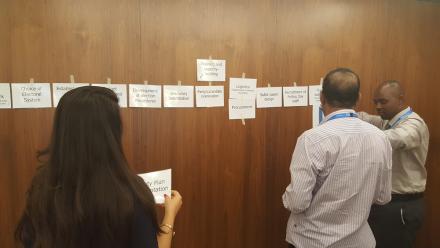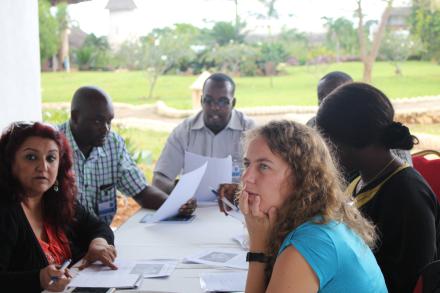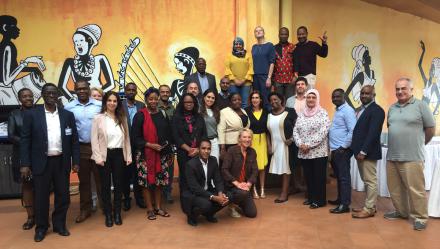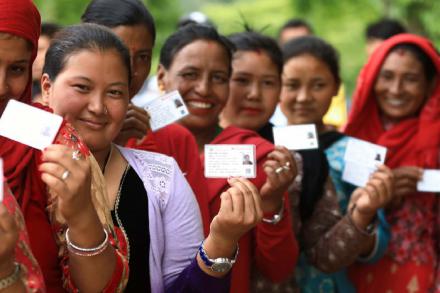
Celebrating 10 Years of Training on Election-related Violence
2022 marks the 10th anniversary of a UNSSC and DPPA partnership to leverage training to contribute to improved coordination and coherence in approaches to election-related violence. As we celebrate this important milestone, we look back on the two organizations’ proactive engagement with peace and security professionals.
In 2012 the Electoral Assistance Division (EAD) of the then Department of Political Affairs (now Department of Political and Peacebuilding Affairs) partnered with the United Nations System Staff College (UNSSC) to design the “A Political Approach to Preventing and Responding to Electoral-related Violence” programme.
Elections are a means to manage political competition and conflict in a peaceful way. However, when the electoral process is flawed or controversial, the ballot box can become the spark leading to violence. Understanding how the technical and political aspect of elections interact is the cornerstone for preventing election related violence.
Through a unique tailored learning offering, UNSSC and DPPA partnered on an initiative to provide United Nations political affairs officers and other peace and security professionals with practical knowledge about elections in transitional, post-conflict and fragile societies. In the last ten years, hundreds of the programme’s participants have gained new skills in election-related conflict risk analysis and various conflict mitigation tools that they can use to prevent and respond to election-related violence and other election-related political crises.

While the majority of elections around the world are peaceful expressions of the right of peoples to choose their leaders, in certain circumstances they have the potential to divide and destabilize. The risk is particularly high in countries with systemic, long-standing and unresolved grievances, combined with a “winner takes all” approach to competitive politics. Since 2007, election practitioners have paid much attention to election process improvements that can reduce the potential for violence to occur. In 2011 the Secretary General’s report on preventive diplomacy identified election-related violence as a new area of focus in conflict prevention. In line with this, UNSSC an DPPA joined forces to develop the “A Political Approach to Preventing and Responding to Electoral-related Violence” programme. Over the past ten years the programme has continuously evolved to focus on developing knowledge about elections in transitional, post conflict and fragile societies.
It takes into consideration the fact that a more political approach is required which recognizes that (i) elections are technical processes but also political events; (ii) election-related violence is most fundamentally a form of political violence, the root causes of which are most often systemic, long-standing and unresolved grievances; and (iii) political violence is often sparked by a single event, such as an election, but the event is rarely the root cause. It is designed to outline the need for a political approach to preventing and responding to electoral violence; develop skills in election-related risk assessments and early warning; incorporate youth sensitive conflict analysis to identify conflict prevention and mitigation tools; outline the role of social media; and explain the role that UN staff in the field and headquarters play in preparing strategies to prevent and mitigate elections-related violence.
As international and domestic scrutiny grows and the flow of information increases, the potential for contested elections may increase, which could further heighten the possibility of election-related violent conflict as well as other election-related political crises. The “A Political Approach to Preventing and Responding to Electoral-related Violence” programme continues to be an important learning tool to build capacity and support peace and security professionals as they work to monitor and mitigate electoral violence.
To date, 670 participants have joined the trainings out of which 641 were UN Staff and 28 represented regional organisations. Out of the total (670) 54.03% are male and 45.97% are female participants. Together they come from 27 different UN departments, offices, agencies, funds and programmes.

In 2014 the UNSSC administered a Level 3 evaluation to participants who had attended the course in Accra, Ghana in June 2014. The Return-on-Investment methodology (ROI) was used to assess the application of the skills provided during the training programme.
Findings showed that the trainings produced some concrete results in the activities performed by participants in their jobs.
They include but are not limited to:
- Participation in pre-election assessments;
- Contribution to or direct participation in electoral Needs Assessment Missions (NAMs);
- Improved support to the Resident Coordinator and UN Country Team;
- Delivery of cascade training for national counterparts involved in the electoral process;
- Better threat analysis in preparation for next general elections;
- Drafting of project document on prevention of electoral violence; as well as on the positive engagement with the National Electoral Commission.

The COVID-19 pandemic required UNSSC and DPPA to put the in-person delivery of the programme on hold for the for the year 2020.
In spite of the 2020 programme break, electoral processes did not come to a complete halt, and peace and security professionals still needed to gain new knowledge and skills on election related violence.
In addition, the push for more coherent and integrated approaches to strengthen prevention and mitigate violence, including election-related violence remains key priority across the UN System. In light of this UNSSC and DPPA agreed to develop virtual trainings as an interim solution in 2021.
Although the virtual editions were a great success, UNSSC and DPPA plan to resume to in-person training from 2022 onwards.
UNSSC and DPPA are proud of their continued partnership on a flagship programme that continues to strengthen the work of United Nations political affairs officers and other peace and security professionals in the pursuit of improved coordination and coherence in approaches to election-related violence.
The Staff College is particularly grateful to all EAD colleagues who since the programme’s inception in 2012, have worked with UNSSC colleagues to provide the best, most updated, realistic and creative learning offering for fellow UN colleagues
Let’s continue the journey together!

Elections are sovereign and deeply political processes that distribute power and legitimize the authority to govern. Accepting defeat is critical in averting violence.